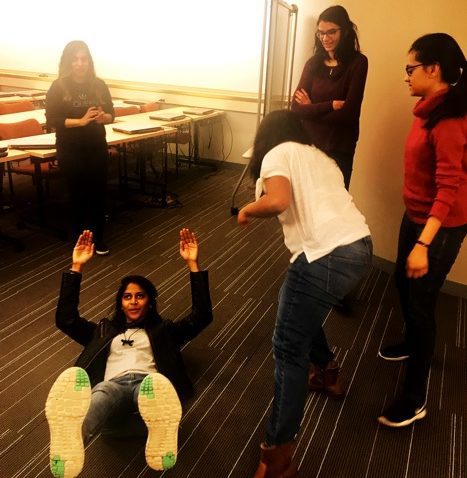Theater and performance art can bring many things to both its audience and actors. It can educate, empower, and start difficult conversations. As part of Asian Heritage Month, the South Asian Sisters @ Harvard are producing Yoni Ki Baat, a South Asian version of The Vagina Monologues, to place a spotlight on gender, sexuality, and femininity in this cultural context. The Mittal Institute chatted with co-directors Amberine Huda and Sheliza Jamal, SAI communications intern, about their involvement and passion for this production.
Tell us a little about Yoni Ki Baat and how you got involved?
Amberine: In a society deluged by post-colonialism, patriarchy, caste systems, sati, and Shar’ia Law, the notion of gender equity, and sexual empowerment has in large part been forbidden and taboo. In the early 2000’s, South Asian Sisters’ Sapna Shahani took the idea of the Vagina Monologues in India, brought it to the United States, and called it Yoni Ki Baat, a direct Desi, or South-Asian version of Eve Ensler’s Vagina Monologues.
Sapna functioned as the bridge between the network of American feminist theater and the blossoming network of South Asian feminist theater. At my alma mater, the University of Wisconsin, Madison, I met the director during an audition for the inaugural production of Yoni Ki Baat. After that, I was hooked; I had the privilege of co-directing this production for three years, with South Asian women and women of color from across the campus and Wisconsin community.

Students rehearse for the upcoming performance of Yoni Ki Baat.
What led you to establish a chapter of South Asian Sisters at the Harvard Graduate School of Education?
Sheliza: I felt that the distinct experiences of South Asian women were missing from many conversations. The Asian American narrative is conceptualized in terms of Asian Pacific Islanders or in the student group PACE (Pan Asian Coalition for Education at HGSE), which do not capture the unique identities of people from the South Asian diaspora. At HGSE, there are a number of International students from India, Pakistan, Bangladesh, and Sri Lanka. The South Asian Sisters @ Harvard provides women a place to express themselves and meet for chai to chat with like-minded women. As a SAS @ Harvard initiative, we decided to produce Yoni Ki Baat, as a part of Asian Heritage Month.
Tell me about the HGSE Performance?
Sheliza: There are approximately 10 women involved from the School of Education, Design, and Engineering. All the women are performing monologues about experiences specific to their life on topics such as sexuality, colorism, puberty, and consent. Some monologues have been written specifically for this performance, and others have been borrowed from the original Yoni Ki Baat Script. We really want to celebrate women and their many talents. From our first rehearsal, the performers showed such strength and vulnerability in their touching stories. It is truly an honor to work with such powerful, fearless, comedic, and loving women.
Where is the show? How do people get tickets?
Amberine: The performance will be held on Thursday, April 19th at Askwith Hall at the Graduate School of Education, 13 Appian Way. Doors open at 6:00 pm and the show will commence at 6:30 pm.
There will be an art showcase featuring artwork from South Asian Female Artists with a reception to follow. We wanted to make this event accessible to both the Harvard and external community, so tickets are free thanks to support from the HGSE Dean’s Diversity and Innovation Fund from the Office of Student Affairs, and the Arts in Education Program.
